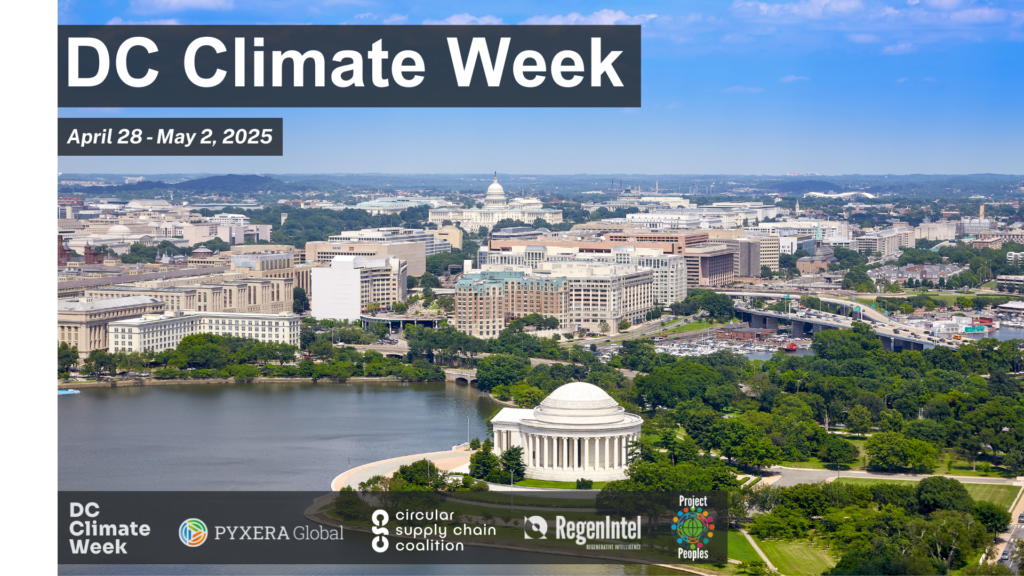The inaugural DC Climate Week (DCCW) is taking place April 28 – May 2, 2025. Join us to explore opportunities to engage with policymakers in the nation’s capital, fund climate solutions, and showcase cutting edge technologies.
DCCW Co-Organizer Anjali Mahadevia recently shared why local climate initiatives are crucial for mobilizing communities and moving towards equitable and regenerative systems, and Pyxera Global is meeting the moment:
- Senior Vice President of Partnership Development John Holm is speaking on a panel hosted by The New York Climate Exchange and The Earth Commons – Georgetown University’s Institute for Environment & Sustainability on the current state of the domestic and global critical minerals supply chain.
- With the Circular Supply Chain Coalition, Pyxera Global is bringing together stakeholders to discuss critical mineral supply chains and the economic opportunity to invest in e-waste recycling.
- Project Peoples, RegenIntel, and the Partnership for Digital Justice (an initiative of Pyxera Global) will highlight the importance of indigenous knowledge to shape a regenerative economy.
Agenda
Tuesday, April 29
- 1:00pm – 3:00pm: The New Resource Race: The Role of Circularity in the Stewardship of the Critical Minerals Commons
- McCourt School of Public Policy: 125 E St NW, Washington, DC 20001
- Register here.
Wednesday, April 30, 2025
- 10:30am – 11:20am: Tapping the Urban Mine: Incentivizing & Scaling Critical Mineral Supply Chains.
- The Square: 1850 K St NW, Washington DC, 20006
- Register here.
- 1:00pm – 3:00pm: RegensUnite! Indigenous Science & Regenerative Action
- Pyxera Global HQ: 99 M St SE, Suite 400, Washington DC, 20003
- Register here by 4:00pm on April 23rd.
The New Resource Race: The Role of Circularity in the Stewardship of the Critical Minerals Commons
The demand for critical minerals has surged, driven by their use in semiconductors and lithium-ion batteries. The use of batteries alone has grown by 33% annually over the past 30 years, with the global EV stock skyrocketing from 100,000 vehicles in 2013 to over 40 million in 2023.
The New York Climate Exchange and The Earth Commons – Georgetown’s Institute for Environment & Sustainability are hosting a panel discussion featuring leaders in policy, research, engineering, and deployment—including Pyxera Global SVP of Partnership Development John Holm—on how circular policy and technology interplay in the stewardship of the critical mineral commons.
Register here.
Tapping the Urban Mine: Incentivizing & Scaling Critical Mineral Supply Chains
Global challenges such as China’s control on critical minerals, rising tariffs, and the escalating climate crisis are endangering global supply chains. We must catalyze and implement a policy landscape that rapidly accelerates remanufacturing practices using tools of government, business, and social sectors, such as legislation, incentives, and partnerships, on the national and sub-national levels.
The Circular Supply Chain Coalition will provide key insights, implementation best practices, and context on the latest developments taking place at the intersection of critical mineral supply chains, decarbonization, and environmental justice. You can learn more in our blog post, The Global Impact of Local Action.
Panelists include:
- Franceso Maria Graziani, Climate & Energy Counsellor, Delegation of the EU for the United States
- Rachel Van Metre Kibbe, CEO, American Circular Textiles
- Alan Young, Director, Materials Efficiency Group Canada
- Session Facilitator: John Holm, SVP, Pyxera Global
Register here.
RegensUnite! Indigenous Science & Regenerative Action
During DC Climate Week, Project Peoples and RegenIntel are teaming up with the Partnership for Digital Justice (an initiative of Pyxera Global) to host a space for exchange, learning, and collaboration.
While many climate solutions are gaining traction, it’s important to recognize that Indigenous Peoples have long held the wisdom and practices needed to live in harmony with the Earth.
During this interactive session, we’ll explore how Indigenous knowledge can shape more just, regenerative climate futures—bridging traditions with science, systems thinking, and climate justice.
Register here.

